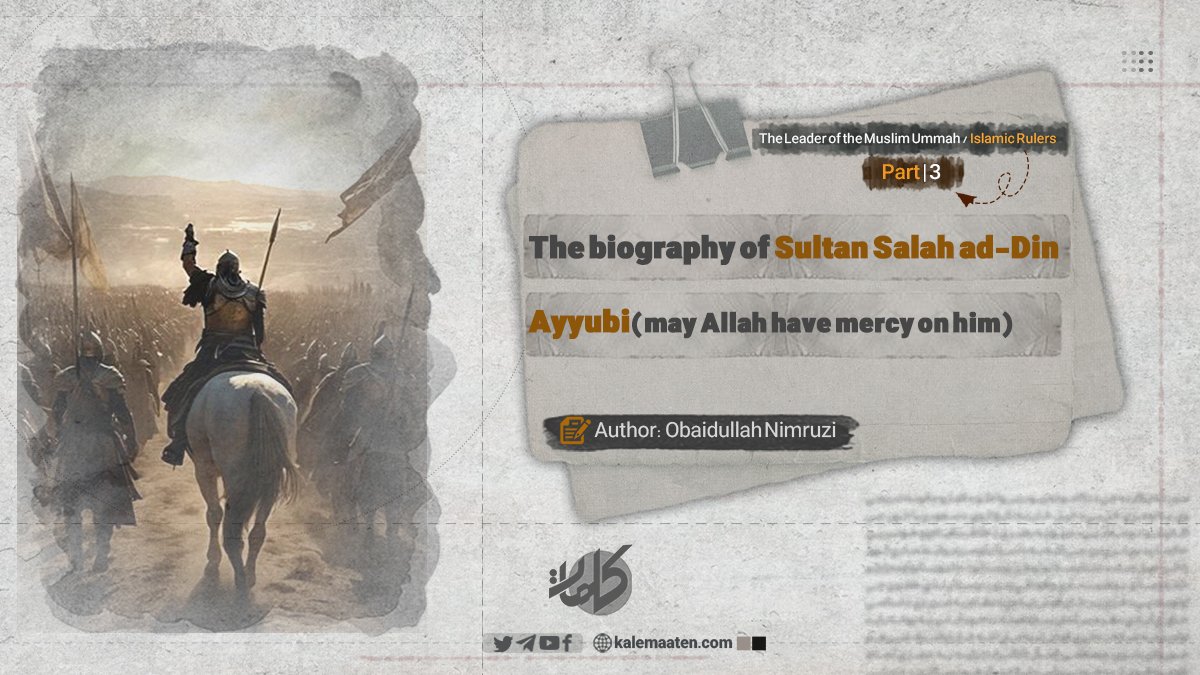
Author: Obaidullah Nimruzi
The Biography of Sultan Salah ad-Din Ayyubi ‘May Allah Have Mercy on Him’ (Part Three)
Atabek Imad ad-Din Zengi
During this period of increasing turmoil and despair in the Islamic world, a new star rose. The Islamic world found itself in need of new leadership and a fresh warrior. From an unexpected corner, a superman emerged. Lin Paul wrote, “It was essential for Muslims to declare jihad and choose a leader whose courage, ambition, and military competence were accepted by all.” The Turkmen leaders and governors under their control had to establish a coalition characterized by chivalry, a warrior spirit, and piety to respond to the onslaught of the Crusaders with force, and this leader appeared in the form of Imad ad-Din Zengi.
After organizing and solidifying his forces in Iraq and Syria, Zengi attacked Edessa (al-Ruha), a city that was the strongest point in the Christian principality. This principality held significant military importance. On the sixth of Jumada al-Akhirah in the year 539 AH (December 23, 1144 AD), Zengi attacked the city of Edessa and captured it; according to Arab historians, this battle was a major victory. The city was a crucial stronghold for the Latin Kingdom, thus safeguarding the Euphrates River from Crusader attacks. Shortly after this conquest, Zengi was martyred in 541 AH (1146 AD) by a slave; however, before his martyrdom, he had planned a great jihad against the Crusaders, which was continued by his illustrious son, Sultan al-Adil Nur ad-Din Zengi.
Sultan al-Adil Nur ad-Din Zengi
Following the martyrdom of his father, Nur ad-Din Mahmoud became the Sultan of Syria, believing he was appointed by all Muslims to expel the Crusaders from Jerusalem and liberate the Holy City from their grasp. He saw this great endeavor as the highest act of worship and a means of drawing closer to Allah. He demonstrated his military power against the Christian principalities during his campaigns.
In the year 555 AH, he took control of the fortress of Hazm, the strongest border fortress in the north, capturing the king of Antioch and other notable commanders. In this battle, ten thousand Christians were killed, and many others were taken prisoner. Following this victory, he also captured the fortress of Banias.
On another front, he conquered Egypt, besieging the Christians from both sides. Lin Paul noted, “The capture by the commander Salah ad-Din and Sultan Nur ad-Din over the Nile meant that the Christian kingdom of Jerusalem was caught in a vice, as it was besieged from both sides. These two forces pressing upon it were, in fact, two forces of one army.” With the capture of the ports of Damietta and Alexandria, along with the seizure of a large warship, the Muslims completely severed the Crusaders’ connection to Europe. Nur ad-Din nearly cleansed all of Palestine of the Crusaders’ presence, but his greatest ambition and most sacred mission was the liberation of Jerusalem, ultimately achieved by his capable general, Salah ad-Din Ayyubi. This is yet another commendable aspect of Nur Ad-Din’s legacy. Sultan Nur ad-Din died in 569 AH (1174 AD) at the age of fifty-three due to a disease known as strangulation (thoracic constriction). According to an English historian, the news of Nur Ad-Din’s death spread rapidly among the Muslims.
Continues…


